#Blade Runner Partnership
Photo

Blade Runner hit theaters nationwide on June 25, 1982. Happy 40th anniversary!
#Blade Runner#Harrison Ford#Rutger Hauer#Sean Young#Edward James Olmos#M. Emmet Walsh#Daryl Hannah#William Sanderson#Brion James#Joe Turkel#Joanna Cassidy#James Hong#Kevin Thompson#Hy Pyke#Ridley Scott#The Ladd Company#Shaw Brothers#Blade Runner Partnership#Warner Bros. Pictures#Warner Bros.#film#live action#live action film#anniversary#film anniversary
81 notes
·
View notes
Text
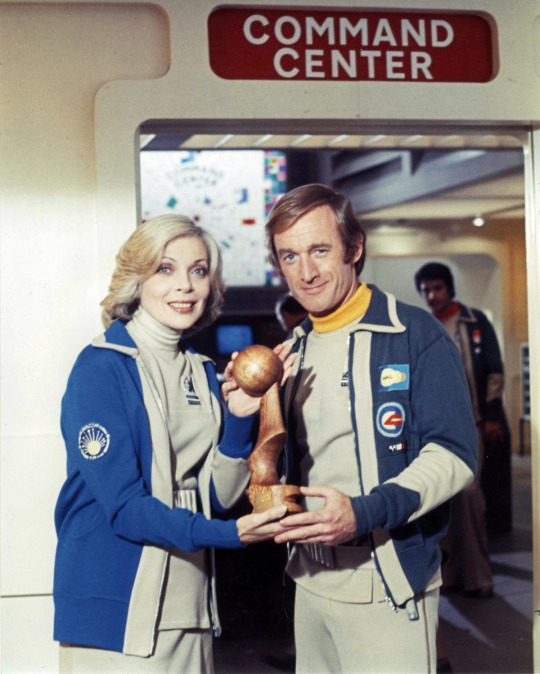
Space: 1999 Stars Barbara Bain & Nick Take Goes Board Documentary About Sci-Fi Show’s Legendary Spacecraft
Actress Barbara Bain, star of the British sci-fi series Space: 1999, is preparing to board an upcoming documentary about the Eagle, the famed spacecraft at the heart of the show that ran from 1975-1977.
Bain will appear in The Eagle Has Landed as will Nick Tate, her cast mate from Space: 1999. The documentary includes the participation of several other notable figures: Apollo XVI astronaut Charles Duke Jr., Academy Award-winning visual effects artist Bill George (Blade Runner, Star Trek), and Brian Johnson, the VFX artist on Space: 1999 whose work is said to have influenced Star Wars. The film is being directed and produced by Jeffrey Morris, who also hosts the documentary.

The Eagle Has Landed “explores the cross-generational impact of the iconic vessel” in the series that also starred Martin Landau. According to a press release, the film “showcases never-before-seen archival footage” and will be released in time for the 50th anniversary of Space: 1999’s debut, in 2025.
“Space: 1999 appeared on TV a few short years after the world watched Neil Armstrong take the first steps on the moon,” Morris noted in a statement. “The show’s unforgettable Eagle inspired a generation to envision a future in space and is still doing so decades later. The question we explore is ‘why?’ What is it about this imaginary craft that has captured and held imaginations for nearly 50 years?

Morris’s FutureDude Entertainment is producing the documentary in partnership with Zero Point Zero Production Inc. Anne Marie Gillen is a producer on the project, along with Morris. The film is written by Morris and Fredrick Haugen. Morris is represented by Espada Entertainment.
Space: 1999 ran for a total of 48 episodes, with Bain and Landau in all of them as, respectively, Dr. Helena Russell and Commander John Koenig (the actors were married to each other at the time; they had previously co-starred together in Mission: Impossible).

The show revolved around the denizens of Moonbase Alpha, scientific researchers living on the moon whose existence was threatened by a nuclear explosion, which rocketed the moon out of Earth’s orbit. Tate, an Australian-born actor, played pilot Alan Carter on 42 of the show’s 48 episodes. Originally, his character was to be killed off in the premiere episode, a casualty of the nuclear explosion, but producers Gerry Anderson and Sylvia Anderson liked his work and expanded his role.

“Hovering above the Moon in one of Alpha’s Eagle spacecraft, Alan Carter is an observer to this holocaust, watching helplessly as the Moon spins out into space,” according to a synopsis published by the Catacombs.Space1999.net website. “Sacrificing his only chance to return home, Carter decides to give chase to the runaway Moon, joining his friends on the endless intergalactic journey.”
Tate told the website, “I didn’t have to dig too deeply with this character. Alan Carter was all the things I was as a young man: friendly, happy-go-lucky, someone who loved adventure and accepted a challenge.”
Ian McShane, Joan Collins, and Leo McKern were among actors who appeared in single episodes of Space: 1999.
youtube
#Space: 1999#The Eagle Has Landed#Jeffrey Morris#Brian Johnson#Eagle Transporter#Gerry Anderson#Sylvia Anderson#ITC Entertainment#Star Wars#Barbara Bain#Martin Landau#Nick Tate#Catherine Schell#documentary#Breakaway Day#Youtube
31 notes
·
View notes
Text
TAG Heuer x THE FALL GUY starring Ryan Gosling
The Swiss luxury watch brand has announced a partnership with Universal Pictures’ The Fall Guy, the new hard-driving, all-star apex-action thriller from blockbuster director David Leitch, in theaters May 3, 2024. The film, from 87North, stars TAG Heuer brand ambassador and Oscar® nominee Ryan Gosling (Barbie, La La Land, Blade Runner 2049) as Colt Seavers, a battle-scarred stuntman who’s drafted…

View On WordPress
#Carrera Chronograph#Press release#Ryan Gosling#Tag Heuer#TAG Heuer Carrera Chronograph#TAG Heuer x THE FALL GUY#THE FALL GUY
7 notes
·
View notes
Text
Blackbird
https://ift.tt/mPuID6V
by restlesscavy
In a world where two types of replicants coexist at the same time, and radioactive dust gradually turns people into abnormals, Gavin Reed, his plastic partner and a robot dog with a bucket head are looking for the answer to the age-old question: can androids dream about their negligent colleagues?
Or.
Commissioner Gavin Reed returns from the Martian colony to settle the case of the RK android and Kamski. All of this is interspersed with flashbacks of how Reed and Richard met, fell for each other, and smooched under the mistletoe for the first time.
Words: 1839, Chapters: 1/3, Language: English
Series: Part 1 of I Was Made for Lovin’ You
Fandoms: Detroit: Become Human (Video Game), Do Androids Dream of Electric Sheep? - Philip K. Dick, Blade Runner (Movies)
Rating: Teen And Up Audiences
Warnings: Graphic Depictions Of Violence
Categories: M/M
Characters: Gavin Reed, Upgraded Connor | RK900
Relationships: Upgraded Connor | RK900/Gavin Reed
Additional Tags: Alternate Universe, Songfic, Unresolved Sexual Tension, Androids, Dystopia, Biopunk, Cyberpunk, Crossover, Smoking, Partnership, Science Fiction, Inspiration, Post-Apocalypse, Developing Relationship, Technology, Murder, Fanservice, Detectives, Drama, Some Humor
2 notes
·
View notes
Photo
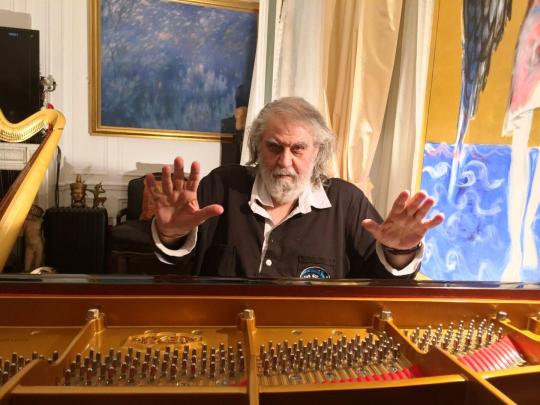
Evángelos Odysséas Papathanassíou (29 March 1943 – 17 May 2022), known professionally as Vangelis, was a Greek musician, composer, songwriter and producer of electronic, progressive, ambient, and classical orchestral music. He was best known for his Academy Award-winning score to Chariots of Fire (1981), as well as for composing scores to the films Blade Runner (1982), Missing (1982), Antarctica (1983), The Bounty (1984), 1492: Conquest of Paradise (1992), and Alexander (2004), and for the use of his music in the 1980 PBS documentary series Cosmos: A Personal Voyage by Carl Sagan.
Born in Agria, Vangelis began his career working with several rock bands of the 1960s such as The Forminx and Aphrodite's Child, with the latter's album 666 (1972) going on to be recognized as a progressive-psychedelic rock classic. Throughout the 1970s, Vangelis composed scores for several animal documentaries, including L'Apocalypse des Animaux, La Fête sauvage, and Opéra sauvage; the success of these scores brought him into the film scoring mainstream. In 1975, he set up his new 16-track studio, Nemo Studios in London, which he named his "laboratory", releasing many solo studio albums on which he experimented with music and concepts, including Heaven and Hell and China among others. In the early 1980s, Vangelis formed a musical partnership with Jon Anderson, the lead singer of progressive rock band Yes, and the duo released several albums together as "Jon and Vangelis". He also collaborated with Irene Papas on two albums of Greek traditional and religious songs.
In 1980, he composed the score for the Oscar-winning film Chariots of Fire, for which he won an Academy Award for Best Original Score. The soundtrack's single, the film's theme, also reached the top of the US Billboard Hot 100 chart and was used as the background music at the London 2012 Olympics winners' medal presentation ceremonies. He also composed the official anthem of the 2002 FIFA World Cup held in Korea and Japan. In his last twenty years, Vangelis collaborated with NASA and ESA on music projects Mythodea, Rosetta and Juno to Jupiter, which was his 23rd and last solo studio album in 2021.
Having had a career in music spanning over 50 years and having composed and performed more than 50 albums, Vangelis is considered to be one of the most important figures in the history of electronic music, and modern film music. He was known for using many electronic instruments in a fashion of a "one-man quasi-classical orchestra" composing and performing on the first take.
For a musician of his stature, little was known about Vangelis's personal life and he rarely gave interviews to journalists. In 2005, he stated that he was "never interested" in the "decadent lifestyle" of his band days, choosing not to use alcohol or other drugs. He also had little interest in the music industry business and achieving stardom, realising "that success and pure creativity are not very compatible. The more successful you become, the more you become a product of something that generates money". Instead, he used it to be as free and independent as possible and often rejected the opportunity to promote or capitalise on his fame.
Vangelis's place of residence was not publicly known; instead of settling in one place or country, he chose to "travel[ed] around". He did own a house by the Acropolis of Athens which he did not renovate. Vangelis did not have children; in 2005, he was in his third long-term relationship and said: "I couldn't take care of a child in the way I think it should be taken care of." Excerpts from other interviews mention that Vangelis had married twice before, one of which was to French photographer Veronique Skawinska, who produced work for some of his albums. A 1982 interview with Backstage suggests that Vangelis was previously married to Greek singer Vana Veroutis, who provided vocals for some of his records.
Although a very private person, according to many accounts he was an "inordinately approachable", "really nice" and "humorous" man, who enjoyed long friendly gatherings, was fascinated by Ancient Greek philosophy, the science and physics of music and sound, and space exploration. His daily activities mainly involved combining and playing his electronic instruments and the piano. He also enjoyed painting. His first exhibition, of 70 paintings, was held in 2003 at Almudin in Valencia, Spain. It then toured South America until the end of 2004.
Vangelis died of heart failure on 17 May 2022, aged 79, at a hospital in Paris. He was suffering from several health issues in the last couple of years and allegedly died of COVID-19 complications, according to a number of reports.
Daily inspiration. Discover more photos at http://justforbooks.tumblr.com
8 notes
·
View notes
Text
Some thoughts on Dune Part Two below:
ARRAKIS TEACHES THE ATTITUDE OF THE KNIFE —CHOPPING OFF WHAT'S INCOMPLETE AND SAYING: "NOW IT'S COMPLETE BECAUSE IT'S ENDED HERE."
from Collected Sayings of Muad'Dib by the Princess Irulan (Dune)
You don't want to make an adaptation that is a direct retreading of an original work because the purpose of adaptation is transformation in a new medium. And sometimes adaptations can evolve beyond what they're adapting (Blade Runner) and sometimes they can become fundamentally rotten without understanding the source material, or not seeking to be constrained by it. This is actually something you will see amongst creators discussing adapting works - like the live adaptation of Ghost in the Shell, where the director felt constrained by fans expecting something cerebral and philosophical of the original. He wanted to advance beyond it, but certainly the brand relied upon some of that cultural cash. (I don't know why they didn't lean more into the SAC or manga). The point being here that where you or I as a fan would not think it creatively constraining to work with adaptation, there are many creators who would view this with some degree of resentment. I looked for this resentment in Dune and I'm not sure I found it; what I think I found instead was more like embarrassment.
Embarrassment or compromise, something like it. It's not an easy book to adapt. I am fine with compromise; I'm not okay with people not willing to get down in the mud with the themes of the book. The Messiah is not comfortable. Paul's tragedy is not comfortable. But if you're going to alter Chani's arc for an ostensibly more feminist reading, then you need to be willing to write her well enough to make her feel organic to the setting. Instead I am treated to dialogue that would come out of any pseudofeminist girlpower schlock today which isn't really fundamentally about empowerment in any meaningful way. I find all of this ironic because ceremonial scenes and active discovery she engages in in the books are entirely absent. Chani is the one to worry about Paul and eventually find him. By removing the catharsis of Chani and Jessica's partnership, you actually elide a meaningful (female) character dynamic! This is only preserved in the film by the fact that it ends with the respective final shots of Chani and Jessica (when it is their conversation that ends it in the book).
The trouble with Frank Herbert is that I don't think Dune is about feminism. But I don't think Dune is really about allegorical reflection either. I think the Bene Gesserit are the Bene Gesserit; a unique modulating power in the Dune universe who happen to comprise largely women. They're weird. They're not straightforwardly seductresses or witches or crones; they're their own complicated shadow policing force negotiating subtle and unsubtle power. The key moment in Dune is when Paul negotiates his ascent to the throne through marriage. The Bene Gesserit know power is much more than the ability to blow something up well. There's certainly more you can expand from there, but what I am trying to say is that there are women with particular types of power in this world with particular types of negotiating tactics, capable of good and evil, and if I were to be making any changes to other female characters it would not be with the perspective of 'how can I make this feminist?' and more 'how can I fit (a more active character) into the setting?' Chani doesn't need to be altered beyond recognition.
In fact, I think it was smart to give Paul's internal struggle to Chani's vocal one. We don't have access to Paul's inner monologue, and overall the contrast between Irulan (key to the throne, height of Paul's corruption) and Chani (not key to the throne, questions his descent) is something which fits very organically into the story! But I am not sure why they had to write the Fremen as resenting their fundamentalist southerners. This felt like a strange type of essentially racism to insert amongst the Fremen and 'fundamentalist' itself was very unwieldy as a term anyway. But you know what conflict was sitting there this whole time? Chani is of 'outsider' blood through Liet Kynes, and her father, in this adaptation. Through her own family she has seen the 'Green Paradise' turn from a dream into a real possibility. That type of power is unifying and is partially implied to be why the Fremen are so dangerous. One dream, one people. The stage is set for Lisan al-Gaib. This would have been a perfect struggle for Chani to introduce. Separately I personally did not enjoy the jocular dialogue written amongst the Fremen and most especially hated the scene where Chani is mocking the Water of Life scene. Not just for the fact that she was key to the ceremony in the book, but because this type of self-awareness is really not Dune tonally.
The self-awareness comes from a Bene Gesserit understanding of propaganda, yes, but this is usually wry internal commentary, or a Paul-Jessica uncomfortable conversation - but no, people are not verbally expressing, generally, that religion is silly and only stupid people believe in that, mostly because that is unsubtle, but because this makes the Fremen sound like an average modern person from our time. It feels out of place. If they were going to express doubt, this is not even how they would express doubt. The intrusion of modern sensibilities where they are not appropriate (vernacular, for instance) is what stands out the most prominent to the point of even making sound Paul like a buffoon (I physically cringed in my seat when they had the slapstick 'slap' of Paul waking up from the Water of Life. That was actually terrible). If you are going to replace book dialogue it had better be better than book dialogue. This is not just the problem of inaccuracy; this is the matter of quality. What I find ironic is that this exchange of ideas to ostensibly empower the Fremen against an Orientalist reading actually ends up making them look worse but also denying them the agency present in the original book... their bribes with the Guild which has allowed them to conduct themselves in secrecy in the South are entirely absent. The Fremen are not a politically or religiously insensible peoples at all. This is the whole dynamic with Stilgar!
To depict the Fremen as mindless fundamentalists is actually a decision I felt to be pretty irresponsible. This is really an interpretation Paul begins to feel at the height of his power in Dune Messiah, so I won't go into it too much, but the more terrifying idea is that the Fremen sensibly believe in Paul's Messianic figure. This is something they kind of preserved in the film but was weakened by the introduction of the fundamentalists. That religious and political power is more subtle than mere miracles or Paul managing to ingratiate himself with the Fremen is what makes Dune resplendent in execution, because it advances beyond a basic thesis that people are stupid or that Messiahs are simple. But you can't avoid the question of colonialism, which is that this is a Duke sweeping up a colonised people through his cult - and I think that if you are reading this without Dune Messiah, then yes I do think a flatter reading is possible, but neither at any point do I think the book is saying Paul is a bad Messiah only because he is not naturally Fremen, or that the Messiah persona is actually separate from trying to negotiate and accumulate power. I'm not actually set on whether they advance this idea through Chani or not - that she doesn't accept a Messiah whether he is Fremen or not - but you can't divorce the dynamic of the Messiah from the coloniser/colonial model in Dune. This is the butterfly effect of changes.
But you may note I am making comparison to the book, except what I have tried to emphasise is that on the terms of the film there are tonally out of place and nonsensical changes. If you want to make a Dune film you want to make a good film, whether it is Dunelike or not. Is my point here clear? The reason I was excited for a Dune adaptation is because I am tired of witless quips - self-awareness and lampshading - clumsy dialogue - pseudofeminist writing (which fails to engage with women anyway!) - political spoonfeeding (I say this as a leftist!) - just a general failure to interact with narrative as a medium to convey ideas to interact with and bear witness to as opposed to a theme park. So I am much harsher on witless quips, self-awareness and lampshading, clumsy dialogue etc. because it stands out much more in contrast to Dune dialogue.
I am also constraining most of my focus here to the narrative decisions made. The cinematography, audio design, acting, etc. esentially all the material elements of production were incredible. I took real issue with the Emperor's casting but that is also partly a consequence of the fact they stripped him of his pathos and humour. But there is the crack in the foundation - my question always is, what is the point of all these effects if it is unsupported by writing? The writing is everything, the connective tissue of ideas is everything, it's the reason the story exists as it does.
There are a litany of structural issues but the chief, and most egregious, was the leap from Paul to Paul Muad'Dib the Messiah/Lisan al-Gaib. It is one single scene with Jamis before I am treated to a rapid character shift which is only ameliorated by Timothée Chalamet. You will know that this is a consequence of cutting the timeskip and Paul not having a son.
It was only after I had seen the film that I tried to consider it from a new light that this is a 'different future' from the books. This is because of the scene where Paul kills the Baron instead of Alia, but he notes that he dies like an animal (like the sorting of the gom jabbar). So to me the question became less was whether it was strictly accurate and whether it was tonally successful - and not all of these changes were. The dénouement with the Emperor was particularly lacking in epic tone, which for a film which had managed to land epic tone was shocking! The reason it suffers in adaptation is because of where it deviates from the books, it can't always manage to fit in new justifications.
There are times where I thought it did (Lady Fenring and Feyd Rautha) but Feyd's scenes are compromised on the basis they chose to make him a psychopath. That was an embarrassing decision and compromises the idea that Feyd and Paul are partly victims of circumstance. If I wanted to heighten his characterisation I would have honestly borrowed from Farad'n in Children of Dune. The acting of Feyd was honestly hard to watch. He took cues from a Jokerlike character. It's hard to watch him freely kill the enslaved women to make him 'scary', where the women are just objects to depicting his evilness (!) which feels bizarrely a lot like inserting more misogyny! This is worsened by the fact he is forced to do this by the Baron in the books. And of course they gave Feyd Beast Rabban's backstory. The idea that Feyd is potentially not as unreasonable as the other Harkonnens was always something which compelled me and spoke more to the ambiguity of Harkonnen/Atreides imagery (similarly to Paul's lineage). But removing the book from the conversation, these scenes are bad because Feyd is a bad and uninteresting character. He feels like a cheap ripoff of an even lower villain.
The scene I really loved him in was the back and forth with the Baron in the arena, but that was also basically straight out of the books - it's a moment where Feyd even exhibits a dark sort of sense of humour, and so does the Baron, and to me what is powerful about humour is its humanising ability, to make a character feel real.
There are other problems I have that I may discuss in other posts. Jessica lost all subtlety as a character. There were new scenes inserted which didn't advance the story and then scenes cut which compromised the pacing. I am shocked they cut Alia as they did (but included her in a vision? Still not sure why she wasn't used as the turning point for him to become Messiah, along with Jamis. Jamis himself was not the problem - I think it helped alleviate the fact Paul shedding tears for him is cut). I was left with this strange sense that I had spent almost three hours watching something which managed to try to do lots of things and then achieve very little. Which is insane. The level of production is of a magnitude I can't convey. The costumery! Bene Gesserit headpieces! The spiritual transformative place of the desert!
I still walked away having enjoyed it. I'm not really sure how, but I think that something they did get right was the sense of journey. I thought of the quote of Muad'Dib from the original Dune novel recorded by Irulan because to me this is my perspective on the adaptations. Where do you choose to cut it and say - this is the story, deal with it? I walked out thinking How are they going to adapt Dune Messiah? and realised, later, that this question is one they probably want me thinking, and they have chosen to set the terms. In some ways I can respect that - and I think that this is the problem of how you choose to transform an original work, whether you go into it with respect, whether you want to be 'beholden' to that world, how you grapple with the parts you dislike, how you try to do interesting technical things to beyond even the source - like with the infrared camera and the Harkonnens. I am seeing someone else's vision of Dune, and the way they have chosen to tell it, and there are moments of transcendence (wormriding; most moments with Paul; the vision of Alia; the recognition of the beauty of the desert; oh, the moment where Paul calls Arrakis Dune - THINK OF IT NOT AS ARRAKIS OR RAKIS. THINK OF IT ONLY AS DUNE).
I think that is what made the experience rewarding, and I think taking a knife to the source material was always going to be necessary. I just think it should be done with total confidence, and with the ability to discern what the source material is doing. I don't think Dune is a failure on the front of not interrogating colonialism - it just doesn't do it with a traditional postcolonial model, which makes it harder for modern readers to identify its critical intentions. I also don't think Dune as a film should be made with compromises in respect to what is en vogue for most films now. Dune is a classic book, and series in general, because it did what it did like no other. Anyway, it is cut.
0 notes
Text
Jonnie Peacock becomes an ASICS ambassador

ASICS today announces the addition of world-renowned sprinter Jonnie Peacock to its roster of athletes. The partnership with Peacock, a true embodiment of dedication, resilience and athletic excellence, marks another remarkable signing and demonstrates ASICS' continued commitment to enabling athletes of all abilities.
Throughout his career, the British blade runner has consistently defied expectations, inspiring millions around the world with his achievements and spirit. Born in Cambridge, England, Peacock lost his right leg to meningitis at the age of five but discovered his passion for running shortly after receiving his first prosthetic leg. Since then, he has become one of the most celebrated impaired athletes.
Peacock first gained international recognition at the London 2012 Paralympic Games, where he claimed gold in the T44 100-meter sprint, setting a new Paralympic record. He successfully defended his title in Rio 2016 and only narrowly missed out on securing a third consecutive sprint title in Tokyo 2020 where he won bronze. Additionally, Peacock has earned numerous World and European Championship titles and world records along the way, cementing his legacy as an extraordinary athlete.
On joining the ASICS team, Peacock said, "I am incredibly proud to join the ASICS family. Their commitment to helping everyone achieve a sound mind in a sound body through exercise, and enabling athletes of all abilities, perfectly aligns with my personal values and aspirations. ASICS has a long-standing reputation for producing high-quality products that enhance performance and support athletes. And just like me, they are never done: always learning, always improving, always striving for the peak by pushing the boundaries of imagination through science and persistence. So I feel honoured to be part of a brand that believes in the power of sport to uplift minds and project positivity."
Olivier Mignon, Director of Sports Marketing at ASICS EMEA, is equally delighted about this new partnership, stating: “We are thrilled to welcome Jonnie Peacock to the ASICS family. He is an exceptional sportsman and he continues to amaze and motivate us through his infectious personality and positive attitude. Jonnie’s inspiring journey and unwavering determination embody the ASICS spirit, and we feel privileged to be providing him with the best possible support and innovative products to fuel his passion."



0 notes
Text
VFX company DNEG expands to India: A Look at the Future of VFX in India
Introduction

VFX company DNEG expands to India
VFX company DNEG expands to India: DNEG, a leading VFX and animation company, has recently announced its plans to expand its operations to India. With an already established presence in Vancouver, London, Los Angeles, and Chennai, the company is now all set to venture into Mumbai. The announcement has been received with great enthusiasm from the Indian entertainment industry and VFX enthusiasts across the globe. In this article, we will delve deeper into the details of the expansion and explore the future of VFX in India.
DNEG: A Brief Overview
Before diving into the expansion plans, let's take a brief look at DNEG's history and its current position in the industry. Founded in 1998, DNEG has grown to become a global leader in VFX and animation. The company has been involved in several major film productions, including the Harry Potter series, Blade Runner 2049, and Avengers: Endgame, to name a few. With its innovative and groundbreaking work, DNEG has won numerous awards, including five Academy Awards for Best Visual Effects.
DNEG's Expansion to India
With the Indian entertainment industry on the rise, it was only a matter of time before DNEG decided to expand its operations to India. The company's new studio in Mumbai will provide a range of VFX and animation services to Indian and international clients. The studio is expected to create employment opportunities for several skilled artists and technicians in the country.
The Future of VFX in India
DNEG's expansion to India is not just a significant milestone for the company, but also for the Indian entertainment industry as a whole. The move is expected to boost the VFX industry in India and encourage other global VFX companies to explore the Indian market. With a vast pool of talented artists and technicians, India has the potential to become a global hub for VFX and animation.
The Challenges Ahead
While the expansion is undoubtedly a positive development, there are a few challenges that DNEG and other VFX companies may face in India. One of the significant challenges is the lack of a robust infrastructure for VFX and animation. While the Indian entertainment industry is on the rise, there is still a long way to go in terms of infrastructure development. Additionally, there is also a shortage of skilled artists and technicians, which may pose a challenge to companies like DNEG.
Conclusion
DNEG's expansion to India is an exciting development for the Indian entertainment industry and the global VFX community. The move is expected to boost the VFX industry in India and create employment opportunities for skilled artists and technicians. However, there are also a few challenges that need to be addressed to ensure the success of the expansion. With the right infrastructure and talent pool, India has the potential to become a global hub for VFX and animation.
FAQs
What is DNEG, and what services does it provide?
DNEG is a leading VFX and animation company that provides a range of services, including VFX, animation, and stereo conversion, to name a few.
What kind of projects has DNEG worked on in the past?
DNEG has worked on a wide range of projects, including feature films, television series, commercials, and music videos. Some of their notable film credits include Inception, Interstellar, and The Dark Knight trilogy.
What kind of employment opportunities will DNEG's new studio in Mumbai create?
DNEG's new studio in Mumbai is expected to create employment opportunities for several skilled artists and technicians, including animators, compositors, and visual effects artists.
Will DNEG collaborate with Indian production houses and filmmakers?
Yes, DNEG's expansion to India is expected to foster collaborations with Indian production houses and filmmakers. The company has already established partnerships with several Indian studios, including Red Chillies Entertainment and Dharma Productions.
What initiatives are being taken to address the infrastructure and talent shortage challenges in the Indian VFX industry?
To address the infrastructure and talent shortage challenges, several initiatives have been taken in recent years. For example, the Indian government has launched the Skill India program to provide training to the workforce in various industries, including media and entertainment. Additionally, several private organizations have set up training centers to provide VFX and animation courses to aspiring artists and technicians.
Also Read: How to Build You Portfolio: Tips and Strategies
“Thank you for visiting Animaders! If you enjoyed this content, please consider liking and subscribing to our website for more amazing content. Your support helps us create even more great content and keep Animaders growing. Thanks again!”
Read the full article
0 notes
Photo
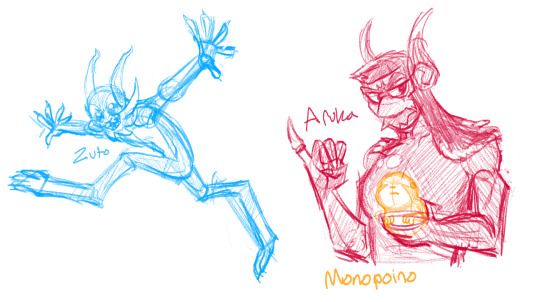
I cannot believe I haven’t posted my Man After Man OCs yet! I also cannot believe that’s a sentence I just said! But this image has been on my computer for at least a week, maybe 2, so it’s about time I posted it.
Zuto is a Desert Runner, Aruka is a Hiver (Bearer variant), and Monopoino is a Seeker.
Aruka’s white spots are a mutation, her skin and fur loses pigment overtime due to stress. If I ever color her in, they’d be a similar color to the Socials’ Queen and Nurse coloration from earlier in the book, whereas the rest of her colors correspond to the appropriate Bearer Hiver coloration depicted in the book. She has finger blades, but they’re more like finger spears because they’re underdeveloped (as the book implies they are in all females iirc? But that’s a bit of a guess because the male Hivers & Socials’ last digits don’t really have joints & are held out straight all the time, whereas the Social Nurses and Queens’ last digits can still bend, and I suspect it’s the same for the Hiver Bearer). Nevertheless, it’s still a weapon, just with different functionality. Aruka is quite dissatisfied with life in the hive, looking to escape. She could probably do it too, since she has Monopoino with her.
Zuto’s whiskers are considerably longer than a standard Desert Runner’s (all the better to keep sand out with..?) and he’s kind of frail. He may have sharp claws and teeth, but he can barely take a hit. He has been to Aruka’s hive before, but the two know each other on a deeper level than that.
My whole story for these 2 is that Aruka flees her hive with Monopoino, and is essentially all alone in the desert until she & Zuto run into each other! So they form a beneficial partnership where Aruka helps Zuto by warding off danger and seeking out food and water with Monopoino, while Zuto helps Aruka become accustomed to life outside the hive. I’m not actually sure if Hivers or Desert Runners can talk (in fact, they probably can’t), but if they could, I’m sure Aruka and Zuto would have very profound conversations about the meaning of life and finding one’s identity...
I think perhaps through Zuto, Aruka learns the skill of deception, something lost to time in her evolutionary history, at least after the days of the Socials...
The next All Tomorrows piece is coming soon, I promise! Thank you everyone who’s been liking & reblogging my first one, I appreciate it very much!!
#yeah I can't rlly fully explain why I made fucking Man After Man OCs before All Tomorrows OCs but like...#I guess it comes down to simplicity?#All tomorrows has so much going on & its posthumans are so wacky & I have to do a bunch of warmups before I draw them#Man After Man's posthumans are just... particularly beastly humans#plus there's tons of species in AT that rlly jump out at me--Man After Man is simple in that my favorites were just these 2 desert species#OCs#Man After Man#spec evo#speculative evolution#Dougal Dixon#man after man fanart#is ANYTHING on that tag at all#does the tag exist#art#digital art#digital sketch#desert runner#hiver#seeker#Zuto#Aruka#Monopoino#yet another tag that does not exist LOL#idk I think giving the tiny little character the longest name is funny... it was a great suggestion from a certain friend I art trade with#oh yeah if anyone was wondering I didn't fork over 400 bucks for this book#I found a pdf of it lol#thank god
20 notes
·
View notes
Text
Blade Runner:Special Photographic Effects

‘‘The special photographic effects for Blade Runner were executed by Entertainment Effects Group (EEG), which is a partnership between Douglas Trumbull and Richard Yuricich. We had a crew of over 50 people involved in miniature work, matte painting, optical compositing and some front projection. The miniature photography extended over a period of about 10 months, starting more or less concurrently with the live action photography. There were over 90 special effects shots made for Blade Runner. Not all of them ended up in the picture, but most of them were quite successful. They varied from simple scenes composited from perhaps three elements to complex shots involving 35 or 40 elements, not counting the positive and negative mattes for each element...’‘
https://ascmag.com/articles/blade-runner-photographic-effects
11 notes
·
View notes
Photo
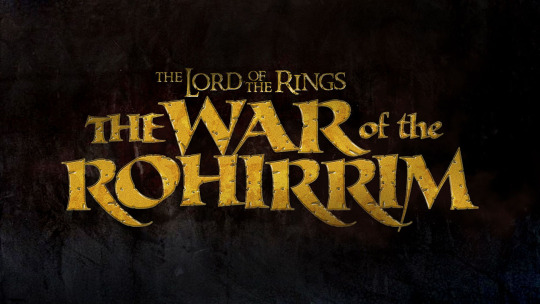
New Line Cinema and Warner Bros. Animation has announced that Kenji Kamiyama (Ghost in the Shell: Stand Alone Complex, Blade Runner: Black Lotus, Eden of the East) will direct the feature anime film The Lord of the Rings: The War of the Rohirrim.
The film is produced by New Line Cinema in partnership with Warner Bros. Animation. Sola Entertainment will animate the film, and Warner Bros. Pictures will distribute the film.
The War of the Rohirrim focuses on a character from the book’s appendix, the mighty King of Rohan, Helm Hammerhand, and a legendary battle which helped shaped Middle-earth heading into LOTR. The anime film will expand the untold story behind the fortress of Helm’s Deep, delving into the life and bloodsoaked times of Hammerhand. Overall, the movie is a companion piece to New Line’s LOTR trilogy and is set roughly 250 years before that movie during the third age.
Joseph Chou (Blade Runner: Black Lotus TV series) is producing, and Jeffrey Addiss and Will Matthews (The Dark Crystal: Age of Resistance) are writing the screenplay. The Oscar-winner Philippa Boyens, who was part of the screenwriting team on the live-action The Lord of the Rings and The Hobbit film trilogies, is a consultant on the project.
“This will be yet another epic portrayal of J.R.R. Tolkien’s world that has never been told before. We’re honored to partner with much of the incredible talent behind both film trilogies, along with new creative luminaries to tell this story. And so it begins.”
- Sam Register, President of Warner Bros. Animation
“All of us at New Line feel a deep affinity for the extraordinary world J.R.R. Tolkien created, so the opportunity to dive back into Middle-earth with the team at Warner Bros. Animation is a dream come true. Fans know Helm’s Deep as the stage for one of the greatest battles ever put to film and, with many of the same creative visionaries involved and the brilliant Kenji Kamiyama at the helm, we couldn’t be more excited to deliver a fresh vision of its history that will invite global audiences to experience the rich, complex saga of Middle-earth in a thrilling new way.”
- Carolyn Blackwood, Chief Operating Officer, Warner Bros. Pictures Group, and Richard Brener, President and Chief Creative Officer, New Line Cinema
#The Lord of the Rings The War of the Rohirrim#The War of the Rohirrim#The Lord of the Rings#LotR#Sola Entertainment#New Line Cinema#Warner Bros. Animation#Warner Bros.#Warner Bros. Pictures#anime#film#anime film
50 notes
·
View notes
Text
Crunchyroll and Toonami Team Up to Bring Mob Psycho 100 and More to Cartoon Network in Latin America
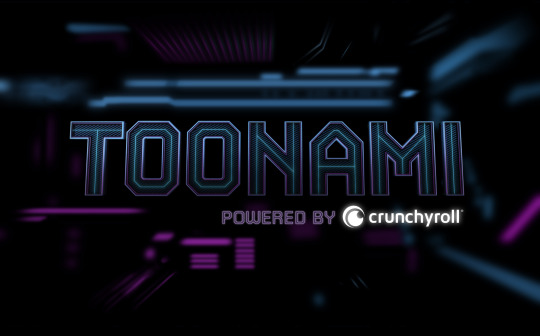
Cartoon Network and Crunchyroll are announcing a partnership to bring Toonami back to Latin America starting August 31, 2020! The new Toonami block powered by Crunchyroll will run Monday through Friday at midnight until 1 AM, kicking off with Dragon Ball Super for the first half hour, and then a mix of series curated by Crunchyroll starting with Mob Psycho 100. Each series will be dubbed in both Spanish and Portuguese. Brady McCollum, Head of Global Operations and International at Crunchyroll, commented on the announcement:
The team at Cartoon Network have been incredible partners in helping us grow the love of anime around and their Toonami block has been the premiere television destination for the anime community By powering Toonami’s return to Latin America with series curated by Crunchyroll, we can’t wait to create even more fans of the medium we love.
This news follows last month’s Adult Swim Con where Crunchyroll and the Toonami team announced that they would be partnering on an original anime series, Fena: Pirate Princess, and revealed a new look into the upcoming BLADE RUNNER - BLACK LOTUS. Crunchyroll has also previously curated anime series for Toonami in the U.S., bringing the first season of Mob Psycho 100 to the block.
1 note
·
View note
Text
Irreconcilable Differences

I touched upon this in my Knightmare Scenario post but there is a shift in how we, as moviegoers, consume film. The Wuha has shown us all that it’s not necessary to actually patron movie theaters to get our flick fix, that streaming services are a viable option for studios to release tent pole movies instead of in the major multiplex franchises. This sh*t could be a death knell for the entire theater industry and they’re lashing out violently. All of this stems from the fact that Trolls: World Tour did f*cking gangbusters on streaming and Universal, the studio attached to this corporate abortion of a film, mad about fur times the profit they would if it was released in cinemas. See, theaters pay for the license to screen films. To recoup that loss, they most of the ticket price. Some more powerful studios like Disney, can force a higher percentage for a shorter time. Maybe forty percent over opening weekend, but that’s it. Everything after that is all theaters until the Wuha f*cked that sh*t all up.

After Universal made more profit than any movie they have ever released, in the shortest amount of time they’ve ever run a film in theaters, they immediately altered their release schedule. They wanted to do dual release; Streaming and theatrical. Theaters, obviously, AMC specifically, we like f*ck all of that. People would definitely forgo the theater experience, with all of the sh*tty food, cramped spaces, and assholes disguised as patrons, to sit on their couch, in their draws, watching with people they actually like. There’s no way the theaters come back from that and, in a deluded effort to strong arm an industry that just realized they don’t even need their partnership, tried to strong arm Universal by boycotting their films. Okay. This sh*t lasted less than a week and the theaters came groveling back. I imagine there were some negotiations behind closed doors because, to give up four times the profit just to prop of a dying industry, ain’t something any business would do out of the kindness of their heart.
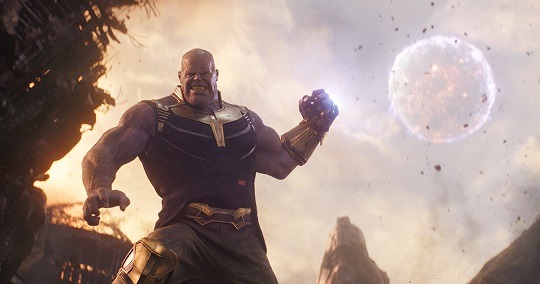
I like the simul-release model a ton. Don't get me wrong, i love the cinema. I love going to the theater, sitting in that AC eating my forty dollar hot dog, and taking in that big ass screen I love that whole experience and, before the Wuha f*cked it all up, i had planned to spend the entire summer in thee. I live down the street from the newest theater built in my area so they have all of the dope sh*t. More to the point, there re some films that absolutely must be seen on a theatrical screen. I cannot express to you how it felt to see Infinity War with a crowd of people. To experience the same emotions as hundreds of strangers was profound. After that film ended, the theater was dead silent. I saw that movie five times, with five different audiences, and the same silence followed each viewing. It was intense and there’s no way you get that on your couch, even is you have a streaming group showing. The experience is completely different. You don’t feel Pete getting dusted the same way you would with a proper audience. That energy is lost in home and you need it to fully experience a true blockbuster like that, properly.
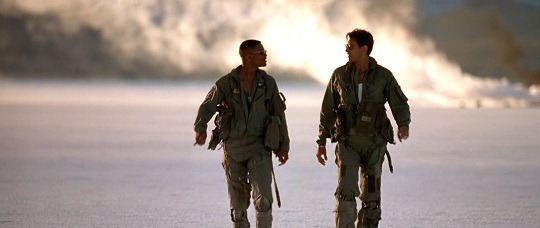
A total shift toward streaming would do a disservice to filmmakers like Christopher Nolan, Denis Denis Villeneuve, Ridley Scott or Michael Bay. I hate Bay with a passion but i did watch a little bit of 6Underground and was profoundly underwhelmed. Bayhem needs the theater screen for it’s gratuitous levels of explosive, sexist, nonsense. It doesn’t work on a sensibly sized television. You’d lose too much of Scott's intimate detail and sweeping vista shots he loves to sprinkle in his films. Dude has a penchant for the nature porn and it is duly appreciated. Denis Villeneuve’s rich shot composition and breathtaking cinematography would fall flat if you’re first experiencing them in your f*cking living room. I should know. I actually have a fifty-two inch, 4k, UHD television and Blade Runner 2049 pales in comparison on my TV, to how I experienced it in theaters. Speaking of experience, anything Nolan makes would immediately be sh*t. His films need to be experienced in a theater, ideally IMAX. That’s how he shoots his films. You need that size. you need that overwhelming immersion. TeneT on the small screen will never compare to it on the screen it was shot for. You will never see that film the way its supposed to, if theaters are done in totally.

It’s not like only theaters see the benefit of a dual-release system. There area lot of great films that fester or languish in their runs because of they’re consumed by the Disney juggernaut or some Fast flick takes all of the screens. It took Ex Machina weeks after releases to make it into theaters out here because it was so niche. I waited for three weeks after the VVitch dropped and had to plead with a good friend of mine to get her manager just to screen it. Hell, Hereditary, one of the greatest performances i have ever seen captured on film, got to my theaters a week late and had only one screen in the basement. Thee were, like, fifty seats in there. Imagine if that thing had the buzz it did and dropped straight to Netlfix. Suspiria had a limited theatrical run and made it’s way to Amazon within months where it has had a pretty lucrative run so far. Imagine the shine it would have received if it had released there immediately instead of getting that niche nod in the actual theater. I mean, i saw all of these films in the cinema because that’s my thing but i can see why and how a streaming release strategy would benefit their visibility far more positively.
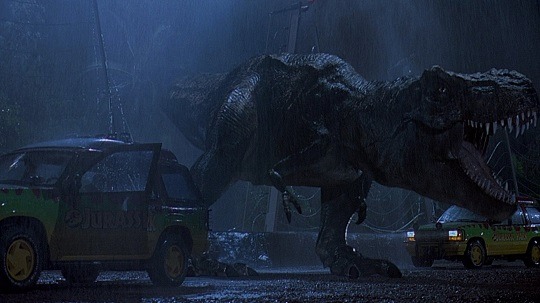
I think, though, this is more than anything, the establishment has the problem with this situation than anything. There is a system in place and no one wants to f*ck it up. Some of the best films i have ever seen were produced, funded, and released to streaming services. Beast of No Nation would have never been successful in theaters but it found life on Netflix. A Marriage Story is another film that i think would have floundered in the cinema. It’s an excellent film that as great performances and a very human tale that was overlooked by the Oscars because streaming isn’t seen as a medium viable for their highfalutin blessing over at the Academy. That sh*t smacks of stuffy, archaic, elitism and it’s a f*cking shame. It cheapens the Oscars and continuously proves that those awards are little more than an ego stroke for a dying Hollywood system. This streaming sh*t is a direct accusation at the old garb.
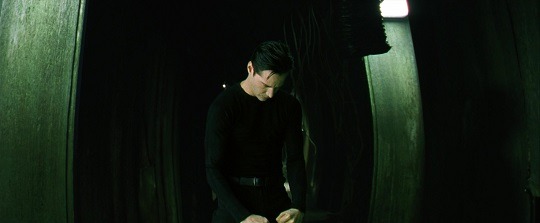
Recently, a film called The Lovebirds dropped on Netflix. It was supposed to release in theaters sometime this month but, since the Wuha has everything so f*cked up, it was sent directly to streaming where it has garnered an amount of success. With an African-American woman and a South Asian male as romantic leads, this probably wouldn't have flown all that well if it had a theatrical release. Considering it uses the fact that they are both brown as the reason for why they would run from the cops after a very obvious misunderstanding, kind of lends itself to me thinking this bad boy would have tanked with broader audiences. This thing’s home release, where certain individuals who might have a not-so-favorably a public stance on us darkies but secretly hate-love our stinky draws, could watch it without anyone knowing definitely contributed to that flick’s success. A success that may have eluded the movie if it was released theatrically because cats can’t be seen supporting certain films.
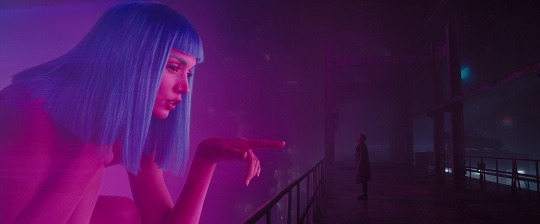
Movies that are driven by people of color not produced by that bojanglin’ Tyler Perry, flick that weave a small scale, human tale of frailty, lost love, and true emotion, or telling a proper, respectful LBGTQ love story, can thrive on streaming. These smaller, more actor driven, movies can side-step all of the political noise that goes along with such visible release dates, avoid conflict with mega-blockbusters, and be readily accessible for anyone curious about their pedigree while making the most money they can. Hell, why even exclude the big-budget fair? Cult films that did okay or even poorly in theaters, like Alita: Battle Angel, can get that big-budget sequel, drop on streaming, and turn a profit with a fraction of the viewership without having to worry about directly competing with an MCU Berserker or some sh*t. I would love to see Alita in theaters for a second round but, if the only way i can revisit this world theatrically would be on the small screen, i am okay with that. Everyone should be okay with that.
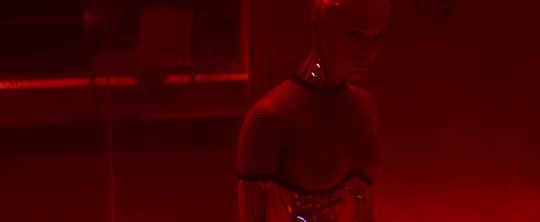
I think the people paying for these movie ARE okay with that. No one i spoke to had any issue with streaming a day-one release. No one I asked had a problem with checking out a summer blockbuster on their TV. We just need theaters and studios to be okay with it. We need theaters to accept the fact that they’re going to have to adjust what they show and how they show it. Studios are going to have to be okay with maybe missing a prestige award for a few years until streaming films become normalized. I think everyone wins in a duel-release scenario. We get more content. Studios can get back to taking risks and letting creators, create. Theaters have more screens to show the moneymakers. I like the position of cinema going in the future. I like the options. This is progress. This is growth. Now let’s just hope the divorce from the theater system isn’t as bloody in the end, as it was in the beginning.

1 note
·
View note
Text
A career in urbanism
*I wonder why he's citing my book. It’s a work of futurism, but it’s to say it’s a work about urbanism. But, who knows, maybe it is.
https://www.allthingsurban.net/blog/Futurist-Greg-Lindsay-on-His-Career-in-Urbanism
Autonomous Mobility, Twitter and Blade Runner: Futurist Greg Lindsay on His Career in Urbanism
11.11.2019, ANASTASIA SUKHOROSLOVA. (((what a great name)))
Greg Lindsay is a journalist, urbanist, futurist, and speaker on the future of cities, technology, and mobility. He is the director of applied research at NewCities and director of strategy at its mobility offshoot CoMotion, as well as a co-author of the international bestseller Aerotropolis: The Way We’ll Live Next.
In the run-up to the CoMotion LA Leadership Conference, we spoke with Greg about his career in urbanism, what brought him to the field and how he envisions the future of cities and urban mobility.
Your career started in journalism. How did it shift to urbanism?
It's like the line from The Sun Also Rises about bankruptcy: gradually, and then suddenly. My interest in cities was awoken by the fact that ultimately every fundamental challenge of the 21st century — whether climate change or inequality, mobility or opportunity — are all urban challenges as well. The city is where these problems and paradoxes are made flesh. And so that’s where I found myself trying to make sense of the world.
What was the most exciting project you worked on, and what was special about it?
From a purely intellectual standpoint, it was when I was asked by the architect Jeanne Gang to join her team for a 2011-2012 MoMA exhibition named “Foreclosed: Rehousing the American Dream.” It was an effort to grapple with what had gone wrong before and after the Great Recession and foreclosure crisis, and whether there was anything designers could do about it. It was fascinating for me because, as a journalist, it was my first time sitting on the same side of the table as architects and understanding how they see the world. For me, everything is a story — what is our narrative arc and who are our characters? — and ideas are hung on that framework. For them, it was: what is our site, and what is our program? Meaning: what do we build and where do we build it? In this case, the site was Cicero, Illinois — no longer the hideout of Al Capone but an overwhelmingly Hispanic neighborhood — and our program was to invent new, more flexible ways of living and working that wasn’t necessarily tied to ownership. In 2012, we didn’t have a name for it, but today you would call it co-housing designed with the needs of local residents in mind. So, I’d like to think we were onto something, even though it never made it out of the museum.
A lot of your work is focused on the future of cities and urban mobility. Can you name three trends that seem most important to you?
Number one is the slow decline of public transport as we know it in the United States, and the causes are both clear (e.g. cars) and complex. On the one hand, a decade-long bull market means a lot of people have bought cars, even though Americans have unprecedented levels of auto debt and the length of car loans are beginning to exceed the length of actually owning the car — seven years, give or take. While that’s happening, bus ridership has declined across America due to disinvestment. (Congestion caused by ride-hailing is making the problem worse.)
The second is mobility-as-a-service, which started as a theoretical means for public agencies to embrace innovative private services while reasserting the importance of mass transit. Instead, the biggest enthusiasts are Uber and Lyft, which are building proprietary “walled gardens” to cross-subsidize operations and build moats around their business. We’re now in an arms race, and I hope cities embracing tools like LADOT’s Mobility Data Specification will swiftly create open standards for public mobility-as-a-service.
Third is autonomy. Not autonomous cars, but autonomy as a general capability that will trickle down to scooters and deliverybots and other forms of robotics that may only vaguely look vehicles. Autonomy will be a lot stranger than most people expect, and I’m anxious to see how cities will regulate them — and whether they will regulate them enough.
What advice would you give to those who are just starting their career in urbanism? What skills will be crucial in the next 5-10 years?
I’m honestly not sure. My core skills are pattern recognition and storytelling, and I don’t think you can go wrong using those to make sense of the world. Find the smartest people you can wherever you can and learn from them. Honestly, the most important tool in my kit is listening to conversations on Twitter.
What are the most thought-provoking books about cities that you’ve recently encountered?
The most thought-provoking book I haven’t read yet is Anthony Townsend’s GHOST ROAD. The best book on smart cities might be Tim Maughan’s INFINITE DETAIL or Bruce Sterling THE EPIC STRUGGLE OF THE INTERNET OF THINGS.
And also BLADE RUNNER, because if you recall the opening credits, the film is set in Los Angeles, November 2019. It’s not the future anymore, but a retro-future, a dystopia-that-could-have-been.
This interview was made as part of our partnership with CoMotion LA, that brings together the global leaders of the new mobility revolution. Join us in Los Angeles on November 14-15 with a 25% discount, register now!
2 notes
·
View notes
Note
Leo, I saw someone say that in the Black Paladins Keith begins to say the letter "I-" before breaking off and saying that Shiro's his brother. Given that he says "I love you" after this, do you think that he was going to say that at first before backtracking and saying it after? What are your opinions on this? Does it mean anything?
Okay, so I just went back and watched it, but didn’t hear an I before that particular line, just some of the pained grunts you’d expect from a guy with a magic burning sword to his throat. However, I definitely think Keith threw out the brother line first because he was hesitant to admit his real feelings–to actually say I love you. And I think there’s evidence as far back as season 2 that supports this, so let’s take a look at that:
If you’re going to talk about this scene, then I think it’s also worth looking back at the BOM. Holo Shiro keeps trying to convince Keith to give up the blade, and uses a number of guilt trips on him. The most prominenant one being, “You know exactly who you are, a paladin of Voltron. We’re all the family you need.” And when Keith says that, he stops for a moment to compose himself. We see him close his eyes, take a moment, then look back at Shiro and go for the brother line. Seriously, go back and listen to it. He says, “Shiro,” first, and then his voice cuts off as he takes that little pause before he finishes with the brother line. He hesitates. So when lots of LGBT people like myself talk about telling their close friends that they love them as just a brother or sister for fear of admitting their true feelings–it’s stuff like this that really hits home for us.
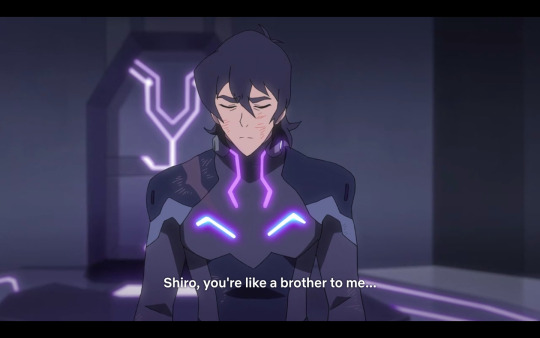
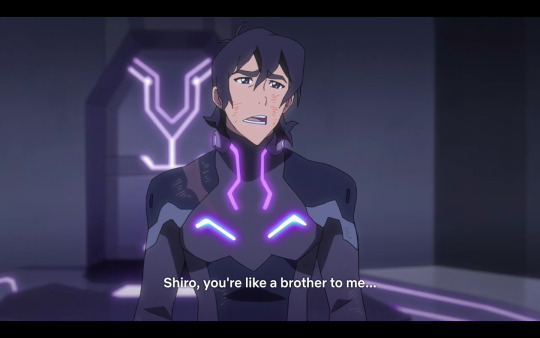
He says this becuase it runs in the same vein as what Shiro said, that they’re family–but still singles out Shiro above all that others. It’s not, yes you’re all my family, it’s that Shiro is. Again, Keith is definitely led along that line of thinking by holo Shiro’s comment about family. Before he delivers that line, Keith has to take a moment to compose himself for it. I think there was probably something else that he wanted to say, but he just wasn’t capable of expressing it at that time. Particularly when he was genuinely afraid of Shiro abandoning him. And then, to top if all off–before walking away, holo Shiro says, “Then you’ve chosen to be alone.” Because it’s painfully clear that the loss of Shiro, him above everything else, that sacrifice would be too much to bear.
So, let’s look at how much Keith has grown by season 6, because it’s beautiful development. This is the BOM all over again, this is an alternate Shiro that tells Keith he’s literally worthless, that his parents abandoned him and he should too, that no one has ever cared for him. Kuron continually insists that no one has ever loved Keith, least of all Shiro. This is the kind of stuff that already broke Keith’s heart during the BOM, his darkest demons. But Keith remains ever resolute, never straying from his path. It doesn’t matter what Shiro says–and even after hearing the atrocity that “Shiro” had slaughtered their entire team, probably Keith’s mother along with them–even then, he still loves Shiro and feels Shiro is deserving of that love.
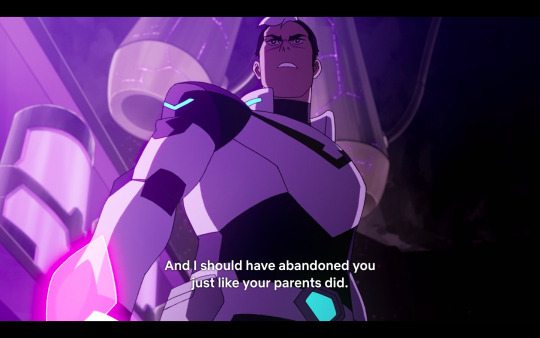
But again, Keith is someone with deeply rooted abandonment issues. He pushes people away and builds up walls to protect himself. He never lets himself get too close to others for fear of rejection. And yet, as the show runners have said, Shiro is his one “exception.” There has always been this easy intimacy there between them, a bond that’s completely unique and unequivocal for Keith. And I think that, in a spur of the moment decision, empowered by all his tenacity and determination, but his willingness to do anything for Shiro’s sake–he was finally able to push himself to admit what he always wanted to say:
Joaquim: “The one exception Keith allowed in his life in terms of expressing himself was probably with Shiro, because he felt the closest to him. And that situation was an extreme series of events. I think he was pleading with him. I think he was letting him know exactly where he stood, and why this shouldn’t be happening. And why he knew that there was still good in there…If you look at Keith going back to the original episode, where he comes out of the shack, and greets Shiro, that’s a very different Keith than the way he acted with all the rest of the Paladins. So I think with Shiro, in particular, his guard is down a bit and he’s able to express himself.”
Lauren: “But don’t expect him to go telling anyone else he loves them.”
Joaquim: “That’s right. He’s not handing out hugs and love hearts to everybody.” (source)
I think Keith being able to admit this heartfelt truth–to both himself and Shiro–is also very much a product of his two years in the time rift. He’s been given so much time to grow and mature, as well as to do some introspective thinking and really reflect on his feelings for Shiro, on what exactly their relationship means to him. Fans have also been pointing out all the clear parallels between Keith’s parents and sheith. And to some extent, I think Keith would be able to see that as well. Maybe by really seeing what a loving partnership looked like, he was able to start quantifying his own feels differently, and perhaps decide what he feels for Shiro isn’t strictly brotherly.

Now, we all know that the brother line didn’t get any sort of response from Shiro. But Keith’s “I love you” yields this very real, visceral reaction for him. In scenes like this, you don’t start by referring to your relationship with someone using the most meaningful term and then work your way down. If you’re desperate and trying to convince someone they mean the world to you, you’re going to keep pushing further and further, until you actually manage to give the most honest and genuine, wholehearted admission that you can.
For Keith, I love you is that. Shiro being like a brother isn’t what matters most about their relationship–might not even be an honest term for it–the fact that Keith loves him is what really counts. And ultimately, it was that and not the brother comment that broke through to Shiro. Because, deep down, Shiro knows that how Keith really feels–knows how much it means for him to say something like that out loud–and Shiro feels it too.
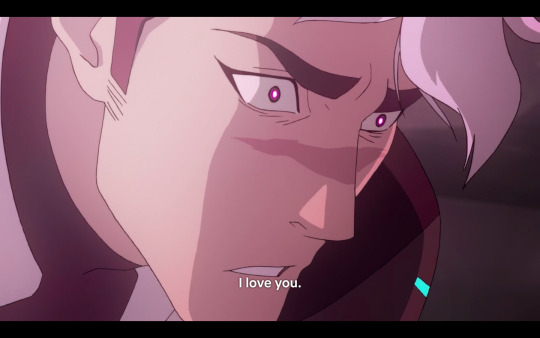
915 notes
·
View notes
Text
2019 PHILIP K. DICK SCIENCE FICTION FILM FESTIVAL ANNOUNCES BI-COASTAL EVENT IN NEW YORK AND CALIFORNIA
The Philip K. Dick Science Fiction Film Festival, the annual festival that honors legendary novelist Philip K. Dick through the dynamic power of science fiction film, is returning for its seventh outing with a full schedule of events. For the first time since its inception, the festival will hold a bi-coastal gathering presenting a lineup of films, premieres and panels for audiences in New York City, Los Angeles and Santa Ana, CA. The ambitious endeavor will provide a platform for independent filmmakers who tackle a variety of themes that empower the narratives of Philip K. Dick, whose work continues to serve as a profound mark on the literary and entertainment worlds.
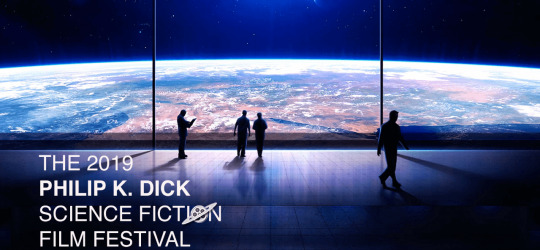
The festival will open in New York City on Thursday, March 7th and Saturday, March 9th. Following its long history in New York, the festival regards the city as an exemplary location to utilize science fiction as a means of connecting with audiences. "We have developed a strong following here," said Daniel Abella, the founder and director of the festival. "Our fans have become loyal supporters of our films and platform so we acknowledge their support by bringing back great sci-fi year after year." Features include Saku Sakamoto's ARAGNE: Sign of Vermillion about a young woman's discovery of a mysterious class of insects and the U.S. premiere of Taking Tiger Mountain Revisited, the remastered version of Kent Smith and Tom Huckabee's post-apocalyptic 1983 film starring Bill Paxton. Then, a lone survivor searches for answers after the human race vanishes in the World Premiere of John Norby's Assimilation.
The west coast edition of the festival will run in partnership with Media Arts Santa Ana (MASA), a non-profit organization that supports its community's cultural empowerment through special resources and initiatives. "We are excited to bring the festival to Santa Ana and allow fans to see some great films," said Victor Payan, the director of MASA who worked with the festival to organize a divine salute to its namesake, a resident of the city in his final years where he wrote several of his last major works. "This will help create discussion about how Santa Ana and Orange County influenced Philip K. Dick's vision and celebrate one of Santa Ana's most treasured and influential artists."
Festivities begin on Thursday, March 14th in Los Angeles with the city serving as a prime destination to bring the festival. "Blade Runner is set in L.A. in 2019," said Abella when referring to the 1982 adaptation of Philip K. Dick's novel Do Androids Dream of Electric Sheep? "There is no better honor than by holding the festival in the very city and year depicted in one of the greatest sci-fi films of all time." Screening titles include Matthew Evan Balz's Corvus, which follows a woman's perilous efforts to build a machine capable of hypnosis and the depiction of extant technology in Emily Dean's Andromeda about an android's awakening of human emotions. Closing the night is Josh Gibson's atmospheric Pig Film about a woman's work on a hog farm during the impending end of the world.
The festival then opens in Santa Ana, CA from Friday, March 15th through Sunday, March 17th. Essential films include Unzipping, the cinematic directorial debut of actress and writer Lisa Edelstein about the poignant unfastening of a marriage and Star Trek veteran Walter Koenig's confrontation with fate in Michael Baker's Who is Martin Danzig? Holding its World Premiere is Tony Dean Smith's mind-bending thriller Volition about a clairvoyant man's quest to avoid his own murder and the U.S. and L.A. Premiere of Sarah K. Reimers' Bitten about a dog's rabid night of risk and adventure. Dive Odyssey kicks off a lineup of feverish documentaries as Janne Kasperi Suhonen takes viewers on an absorbing aquatic journey and Colin Ramsay and James Uren decipher what makes "good" artificial intelligence in the dawn of ethics and technology in Good in the Machine.
Observing the 90th anniversary of Philip K. Dick's birth and the 50th anniversary of Blade Runner's origin novel, the two organizations joined forces for the Philip K. Dick Multicultural Dystopian/Sci Fi Short Film Challenge, a short film competition that invited participants to develop projects that analyze contemporary life in view of themes associated with Philip K. Dick. The challenge also evaluated Philip K. Dick's cultural influence on the Santa Ana community and to encourage the representation of multicultural stories by traditionally underrepresented sci-fi filmmakers. "Anyone who has ever felt alienated should look up to PKD," said Abella. "Because the heroes in his stories were everyday people attempting to retain their dignity in a progressively dehumanized world."
The festival's expansion has also furthered its commitment to feature a more inclusive brand of filmmaking with 31 percent of the official selections directed or co-directed by women and minority filmmakers. Many films are seen from the perspectives of racially and gender diverse characters. "There is a new freshness entering the genre," said Abella, who curated an equality-driven showcase of films from the emerging talent strengthening the industry. "Science fiction is based on exploring the 'other' and no one is more qualified than those groups who have been marginalized to tell their story using the tools of sci-fi."
THURSDAY, MARCH 7, 2019:
Museum of the Moving Image (36-01 35th Ave, Astoria, NY 11106)
Block 1: Best of Philip K. Dick Short Films
Time: 6:00pm - 8:00pm
Glitch Noir 2 - The Rise of el Pelon (2018)
Director: Cody Healey-Conelly
Run Time/Country: 1 min, USA
Synopsis: A trailer to the sequel of Glitch Noir tells the story of a futuristic private eye who with the help of an A.I. that processes big data, tracks and unhinged killer through the murky neon streets of the Sprawl.
The Last Office (2018)
Director: Trevor Hoover
Run Time/Country: 12 min, USA
Synopsis: In an alternate 1940s, a switchboard operator must endlessly serve as the link between two worlds, connecting calls across the barrier line of life and death. One day, he fields a call from someone he knew in a past life.
Harsh Reality (2018)
Director: Iain Marcks
Run Time/Country: 18 min, USA
Synopsis: A cynical professional gamer's life is turned upside-down when he's forced to see the world in a different way.
Some of Her Parts (2018)
Director: Abie Sidell
Run Time/Country: 11 min, USA
Synopsis: When future medicine allows people to live past the human body's shelf life, a young woman visits her grandmother in the hospital and is forced to question the value of immortality when you still end up in a box.
How I Got to the Moon by Subway (2018)
Director: Tyler Rabinowitz
Run Time/Country: 13 min, USA
Synopsis: After being diagnosed with ALS, a curmudgeonly older man goes to the hospital with his partner to record his voice bank before he loses the ability to speak.
Regulation (2018)
Director: Ryan Patch
Run Time/Country: 11 min, USA
Synopsis: In the near future, a young social worker named travels to a small community to administer behavior-modifying 'patches' that guarantee happiness for the wearers. She then must decide what to do when a precocious 10-year-old girl refuses to accept the patch.
To Be Forgotten (2018)
Director: Masa Gibson
Run Time/Country: 25 min, USA
Synopsis: A recovering addict trying to erase the online records of his past transgressions gets a call from a mysterious company that claims it can help him be forgotten - not only by the Internet, but by all the people that ever knew him and by the natural world itself.
The Desert (2018)
Director: Ben Bigelow
Run Time/Country: 14 min, USA
Synopsis: In a suburban mansion, a woman sneaks into her son's virtual reality chamber. Here, he wanders through a desert with extraordinary powers. The machine is intended as a psychiatric treatment, yet Martha's trespass sets in motion a series of threatening events. The virtual reality, it seems, has begun to leak into their home.
Post-Film Q&A:
Screenings will be followed by an in-depth discussion with filmmakers.
Block 2: International Sci-Fi Short Films
Time: 8:00pm - 10:00pm
The Ticket (2018)
Director: James Villeneuve
Run Time/Country: 11 min, Canada
Synopsis: A man's life takes a dark turn when he accepts a ticket to board a giant space craft.
Synthia (2018)
Director: Maria Hinterkoerner, Bernhard Weber
Run Time/Country: 12 min, Austria
Synopsis: In the near future of Vienna, every household is supported by a personal assistant robot called Synthia, built by tech giant ENYO. The robot is equipped with a neuronal network and has access to all electronic devices. Synthia listens, and she learns.
N (2018)
Director: Iacopo Di Girolamo
Run Time/Country: 14 min, Italy
Synopsis: An expressionist nightmare in which an inventor and his colleague test the 'Automaton,' a machine able to create things from nothing. The machine works perfectly as long as the items it is asked to create start with the letter "N" in German. The results of the test will be predictably catastrophic.
I Want To Kill (2017)
Director: Dan Yadin
Run Time/Country: 5 min, USA
Synopsis: An unhinged, psychedelic romp through the bleak depths of space.
Into the Dark (2018)
Director: Benjamin Berger
Run Time/Country: 12 min, USA
Synopsis: In the wake of a widespread viral epidemic, two U.S. soldiers stranded during their mission must fight to survive while an old man and his ailing daughter, running low on food, wait to be rescued.
Destroyer of Worlds (2018)
Director: Samual Dawes
Run Time/Country: 44 min, UK
Synopsis: A precocious teenager must reluctantly leave his life in 1954 behind when his father makes the most devastating discovery to date: Leap Theory.
Post-Film Q&A:
Screenings will be followed by an in-depth discussion with filmmakers.
SATURDAY, MARCH 9, 2019:
Producers Club (358 W 44th St, New York, NY 10036)
Block 1: Japanese Anime Feature
Time: 11:00am - 12:30pm
ARAGNE: Sign of Vermillion (2018)
Director: Saku Sakamoto
Run Time/Country: 76 min, Japan
Synopsis: Directed by the digital effects producer of Ghost in the Shell 2: Innocence, a college girl moves into a building on the outskirts of town and sees an insect coming out of the arm of a woman. She learns that they are called "Spirit Bugs," and have existed since ancient times. Unravelling the mystery, she discovers this is only the prelude to a new form of terror.
Block 2: International Sci-Fi Short Films
Time: 12:30pm - 3:00pm
The Vault (2018)
Director: Sara Martins
Run Time/Country: 10 min, Canada
Synopsis: In this post-apocalyptic sci-fi web series, a ragtag group of survivors live in an underground military bunker known as Vault 175.
Seedling (2017)
Director: Stevie Russell
Run Time/Country: 13 min, Ireland
Synopsis: A young couple have an encounter with a strange, unknown life form.
Graffiti (2017)
Director: Barcsai Bálint
Run Time/Country: 19 min, Hungary
Synopsis: A delinquent sees graffiti of his future self and tries to understand what is happening.
Compatible (2018)
Director: Pau Bacardit
Run Time/Country: 15 min, Spain
Synopsis: In this web series, a man has an opportunity to upgrade himself for greater electronic compatibility.
Colony (2018)
Director: Catherine Bonny
Run Time/Country: 15 min, Australia
Synopsis: Indentured servants try to establish a new planet but something is alive in the ocean.
Eva (2018)
Director: Xheni Alushi
Run Time/Country: 15 min, Switzerland
Synopsis: An introverted young girl discovers a gateway to a parallel world, in which she finds comfort and ease for her guilt.
Birth (2018)
Director: Andrea Cecconati
Run Time/Country: 16 min, Italy
Synopsis: Inside a waiting room where people choose to be born or be deleted forever, a little girl tries to drive people who have chosen not to exist into the row of birth.
Space Between Stars (2018)
Director: Samuel W. Bradley
Run Time/Country: 10 min, Canada
Synopsis: A group of ethereal creatures exploring a derelict space station are drawn out into the vast, unsettling environment. As their fate begins to crystallize, questions are raised about the nature and ambiguity of conflict.
Space Flower (2018)
Director: Pam Covington
Run Time/Country: 13 min, USA
Synopsis: A young woman longs for a forbidden love.
From Life (2018)
Director: Uli Meyer
Run Time/Country: 8 min, UK
Synopsis: An amateur artist sketching in a churchyard has a series of encounters with a young woman believed to be a ghost. In fact, the truth is stranger than that.
La Supercafetera (2018)
Director: Vektorjack, HD Carlos
Run Time/Country: 10 min, Spain
Synopsis: Three friends share a very special coffee maker but instead of coffee it produces pin badges which give superpowers to those who wear them. By using these superpowers, the three geeks get involved in a quest that will eventually take them to a post-apocalyptic future.
Post-Film Q&A:
Screenings will be followed by an in-depth discussion with filmmakers.
Block 3: Best of Philip K. Dick Short Films
Time: 3:00pm - 5:00pm
The Last (2018)
Director: Samuel Turner and Andrew Dobson
Run Time/Country: 9 min, UK
Synopsis: Struggling to survive in isolation, a scientist carries out vital work.
The Last Dance (2018)
Director: Chris Keller
Run Time/Country: 8 min, UK
Synopsis: In the not-too-distant future, an old man works alone in his garage, click-click-clicking the hours away on an old desktop computer. He is making something great and the not-too-distant future will become the not-too-distant past.
The Jump (2017)
Director: Andy Sowerby
Run Time/Country: 10 min, UK
Synopsis: An astronaut braves a pioneering solo mission into deep space, leaving behind her loving husband. Through disjointed communications, she discovers her life on Earth has changed forever.
Baby I'm Yours (2017)
Director: Hadley Hillel
Run Time/Country: 12 min, USA
Synopsis: In the future as it was imagined in the 1950s, a boy notices his mother acting strange and begins to question whether or not she is a robot.
Uncle Griot (2018)
Director: Paul Charisse
Run Time/Country: 6 min, UK
Synopsis: A young girl takes her uncle for a walk.
The Drone (2018)
Director: Wojciech Lorenc
Run Time/Country: 14 min, USA
Synopsis: DJ, a small quadcopter is simply trying to fit in.
Zoe (2018)
Director: Leif Brönnle
Run Time/Country: 17 min, Germany
Synopsis: A young woman without identity or memory. Two scientists with great ambition. A sequence of tests that will bring them all to their psychological frontiers.
The Photographer (2018)
Director: Mazhar Kamran
Run Time/Country: 18 min, India
Synopsis: A woman appears to a photographer but sometimes not in his photos.
Faulty Father (2018)
Director: Benjamin Welmond
Run Time/Country: 10 min, USA
Synopsis: In the near future, a young father's morning routine is put on the fritz when he uncovers his wife's bizarre secret, one that forces him to question his sense of self and his role in the family.
Post-Film Q&A:
Screenings will be followed by an in-depth discussion with filmmakers.
Block 4: Horror and Sci-Fi Short Films
Time: 5:00pm - 7:00pm
Headcleaner (2018)
Director: Nick Scott
Run Time/Country: 29 min, UK
Synopsis: A documentary filmmaker follows a working class recluse from Scotland who can control his environment through the power of sound. Over a fractured timeline, viewers witness the struggle to reconcile the recluse, his mastery of sound and a found footage tape of a sonic weapon called The Drone Tape, tested on humans in the seventies that will ultimately lead to horrific consequences for the filmmaker's family and the world at large.
Post Mortem Mary (2017)
Director: Joshua Long
Run Time/Country: 10 min, Australia
Synopsis: A girl and her mother run a post mortem photography business in 1840's Australia.
Whistler's Mother (2018)
Director: Robbie Robertson
Run Time/Country: 18 min, USA
Synopsis: The artist James McNeill Whistler spent years trying to capture the essence of his mother for his most famous work of art—not to create a masterpiece but to save his mother from possession by the Baba Yaga, an evil Russian witch.
The Observer Effect (2017)
Director: Garret Walsh
Run Time/Country: 19 min, Ireland
Synopsis: A woman is haunted by a dark watcher, a man obsessed with thoughts of her vicious murder but as the fateful hour draws near bizarre events unfold to reveal truths they could never imagine and a secret that will change their lives forever.
The Cold Dark (2018)
Director: Mikko Löppönen
Run Time/Country: 19 min, Finland
Synopsis: A woman wonders off into the dark to search for medicine for her wounded father. As she rummages a cabin, she stumbles upon two men who grant her cover for the night. But something outside is listening.
Thursday Night Basic (2018)
Director: Mike Hay
Run Time/Country: 5 min, UK
Synopsis: The story of a man who is changed and ultimately transported to another place, maybe even another dimension, due to watching some strange 8mm footage and drinking something even stranger.
Beyond the Wall of Sleep (2017)
Director: Peter Miller
Run Time/Country: 10 min, Australia
Synopsis: An exploration of sleep, sanity and space via H. P. Lovecraft and The Rules and Regulations of the Insane Asylum of California.
Post-Film Q&A:
Screenings will be followed by an in-depth discussion with filmmakers.
Block 5: Feature Presentation
Time: 7:00pm - 8:30pm
Taking Tiger Mountain Revisited (2018) — U.S. Premiere
Director: Kent Smith, Tom Huckabee
Run Time/Country: 77 min, USA/UK
Synopsis: In this remastered version of the 1983 film, an American draft dodger in a dystopian future is brainwashed and programmed by militant feminists to assassinate the Welsh minister of prostitution. Lurching unwittingly toward his goal, he makes a series of furtive connections with societal outliers like himself, including a feral child, a gentle prostitute, a sadomasochistic delinquent, a lovelorn androgyne, a hippie dope dealer, and a mute nymphomaniac while fending off predators who would sell him into sex slavery. Eventually, he is forced to focus on his mission and face the dreadful dilemma tormenting his psyche: to kill or not to kill. Starring Bill Paxton (Aliens). Written and directed by Tom Huckabee and Kent Smith. Co-written by William S. Burroughs, whose source material Blade Runner (a movie) provided a basis for the film.
Block 6: Experimental Sci-Fi Feature Presentation
Time: 8:30pm - 10:00pm
Assimilation (2018) — World Premiere
Director: John Norby
Run Time/Country: 79 min, Ireland
Synopsis: In the near future, exponential growth in technology triggers an event that wipes humankind off the face of the Earth. But from where did the grand plan for this event come and who or what is behind it? A lone survivor searches for answers in her quest to reconnect with life.
THURSDAY, MARCH 14, 2019:
Echo Park Film Center (1200 N Alvarado St, Los Angeles, CA 90026)
Block 1: Sci-Fi Short Films
Time: 7:00pm - 9:00pm
Corvus (2018)
Director: Matthew Evan Balz
Run Time/Country: 10 min, USA
Synopsis: A woman builds a machine with hypnotic capabilities.
No Country for Old Lizards (2018)
Director: Emiliano Rago
Run Time/Country: 4 min, USA
Synopsis: A conspiracy theory fanatic finds out an unpleasant truth.
A Psalm of Sight - Verse 1: Zerfall (2018)
Director: Julian Curi
Run Time/Country: 15 min, USA
Synopsis: Gifted with eternal life after drinking from the Holy Grail, a medieval knight spawns an alternate history where technology is God, and man is machine.
Dace Road (2018)
Director: Silk
Run Time/Country: 9 min, France/UK
Synopsis: On a night ride, a female cab driver tries to convince her client he is in a coma and that a collision is the only way for him to wake up.
The Golden Record (2018)
Director: Rachel Goldfinger
Run Time/Country: 7 min, USA
Synopsis: An alien crosses her barren planet and stumbles upon a record from Earth. While she is mesmerized by the record's bold, beautiful images, she undergoes a harsh awakening that only her own reality can truly comfort her.
The Well (2018)
Director: Adam Wheeler
Run Time/Country: 19 min, USA
Synopsis: When Ted, a withdrawn bachelor discovers a mysterious book while searching for his recently disappeared mother, he enlists the help of an old high school science wiz to piece together a confounding puzzle that seems to center around his family home.
The Great 60 Days (2018)
Director: Tae-Woo Kim
Run Time/Country: 9 min, South Korea
Synopsis: A doctor experimenting on fruit flies develops a substance that can dramatically increase activity in brain cells. After a series of failures, one fruit fly finally has a huge reaction when its intellect becomes mutated.
Andromeda (2018)
Director: Emily Dean
Run Time/Country: 15 min, USA/Australia
Synopsis: An android who, through her friendship with a little girl, becomes alive.
Void Vision (2018)
Director: Alexander Stewart
Run Time/Country: 8 min, USA
Synopsis: An abstract short in which real and the simulated are equally constructions; a space where doubles, twins, duplicates, re-creations, and copies blend into one another.
Post-Film Q&A:
Screenings will be followed by an in-depth discussion with filmmakers.
Block 2: Feature Presentation
Time: 9:00pm - 10:00pm
Pig Film (2018)
Director: Josh Gibson
Run Time/Country: 60 min, USA
Synopsis: In an empty world, a solitary female mechanically follows the protocols of a factory hog farm. Her labors are sporadically punctuated by musical rhapsodies as she moves toward the impending end. Is it the end of the world, a program malfunction, or the beginning of a film?
FRIDAY, MARCH 15, 2019:
Ebell Club (625 French St, Santa Ana, CA 92701)
Block 1: Philip K. Dick Multicultural Dystopian/Sci Fi Short Film Challenge
Time: 7:00pm - 8:00pm
Winning films to be announced at the screening. Filmmakers will be present for a post-film Q&A.
Block 2: "When Worlds Collide" Short Films
Time: 8:00pm - 9:00pm
Deep Dive (2018)
Director: Mohammad Soleimanifeijani
Run Time/Country: 6 min, USA
Synopsis: A young Persian refugee arrives at the border of Los Angeles and is given a mandatory set of government-issued immigrant transition AR lenses. Shut out of other people's reality she slowly descends into a new form of digital alienation.
Who is Martin Danzig? (2018)
Director: Michael Baker
Run Time/Country: 11 min, USA
Synopsis: A mysterious old man sits in the park feeding pigeons, ruing the refuse of humanity encroaching on his sanctuary. He then meets his much younger replacement and learns to accept his future - with the fate of all humanity in the balance. Starring Walter Koenig (Star Trek) and Kevin Page (RoboCop).
Precipice (2018)
Director: Sean Young
Run Time/Country: 4 min, Canada
Synopsis: The planet's organics-engineer must decide if we are a species worth salvaging or if eradicating all life on Earth is the answer.
Unzipping (2018)
Director: Lisa Edelstein
Run Time/Country: 15 min, USA
Synopsis: A woman feeling unfulfilled discovers a zipper tab under her husband's tongue. Unable to resist, she pulls it and her entire life changes. But when newness turns into the new normal, she is once again unfulfilled and realizes her mistake: the problem has always been her. Starring Lisa Edelstein (House, Girlfriends' Guide to Divorce) in her cinematic directorial debut.
Tomorrow, Shall We All Be Transhumans? (2019)
Director: Benoît Schmid
Run Time/Country: 9 min, Switzerland/France
Synopsis: Jump into a mesmerizing journey into the spirit of the first man who succeeded to digitize his own brain, algorithm his soul, and who injects himself some Holy Transgenic Fluids in order to transcend his flawed flesh.
Post-Film Q&A:
Screenings will be followed by an in-depth discussion with filmmakers.
Block 3: Special Guests
Time: 9:00pm - 10:00pm
A panel of special guests to attend the festival with an announcement made at a later date.
SATURDAY, MARCH 16, 2019:
Orange County Museum of Art: OCMA (1661 W Sunflower Ave, Santa Ana, CA 92704)
Block 1: New Frontiers: Documentaries From The Edge
Time: 11:00am - 12:45am
Dive Odyssey (2018)
Director: Janne Kasperi Suhonen
Run Time/Country: 9 min, Finland/Norway
Synopsis: A meditative journey into the depths of water and mind, viewers enter on a journey into crystal clear darkness where the only light ever is man-made.
Weather and Chaos: The Work of Edward N. Lorenz (2018)
Director: Josh Kastorf
Run Time/Country: 11 min, USA
Synopsis: The first film about Edward N. Lorenz and his role in Chaos Theory produced with the participation and of scientists who worked alongside him. With their help a closer look is taken at what the "butterfly effect" actually meant in the context of Lorenz's work and why it should make all rethink the understanding of the universe.
Nobody Dies in Longyearbyen (2017)
Director: David Freid
Run Time/Country: 9 min, Norway
Synopsis: Permafrost in a northern island of Norway is affecting Global Seed Vault, infectious diseases like anthrax, influenza and global warming.
Good in the Machine (2018)
Director: Colin Ramsay, James Uren
Run Time/Country: 15 min, UK
Synopsis: The question of how to make "good" AI, what it means for a machine to be ethical, and who or what is the agent of the machine.
Every Ghost Has An Orchestra (2017)
Director: Shayna Connelly
Run Time/Country: 7 min, USA
Synopsis: What happens after we die is a universal question explored by paranormal researcher and experimental composer Michael Esposito. He straddles the line between spiritual and material and asks the audience to reflect on our purpose, legacy and what our actions say about who we are.
UnderSee (2018)
Director: Margie Kelk, Lynne Slater
Run Time/Country: 6 min, Canada
Synopsis: Sea creatures with large eyeballs are curious about invasive gray sludge.
Beth's Three O'Clock with Dr. Harlow (2018)
Director: Emma Penaz Eisner
Run Time/Country: 3 min, USA
Synopsis: A woman discloses a recent dream to her analyst. A vivid study of casual brutality and failed empathy, this surrealistic film intermixes stop motion animation with live action sequences.
Musa Malvada (2018)
Director: Liz Tabish
Run Time/Country: 15 min, USA
Synopsis: In London 1929, a fortune teller with dark secrets of her own visits various clientele throughout the city. As she navigates the tempestuous personalities and shocking visions, she must choose between telling the truth and her own survival.
Extent (2017)
Director: Paul Michael Draper
Run Time/Country: 13 min, USA
Synopsis: Time stands still as two old friends attempt to grapple with a question that defines their very existence. If you could live forever, would you?
Post-Film Q&A:
Screenings will be followed by an in-depth discussion with filmmakers.
Block 2: Feature Presentation
Time: 1:00pm - 2:30pm
Mechanical Telepathy (2018)
Director: Akiko Igarashi
Run Time/Country: 76 min, Japan
Synopsis: The depiction of love and skepticism through the relationships between researchers who visualize human hearts.
Block 3: International Sci-Fi Short Films
Time: 4:00pm - 5:45pm
I Don't Want To Be Alone (2019)
Director: Sergio Rozas
Run Time/Country: 19 min, Spain/Japan
Synopsis: A lonely girl walks around a future Tokyo chased by weird huge monsters. Even though she fights them, the monsters just keep growing in size and number so the girl has to make a decision.
Blink (2018)
Director: Atmaja Bopardikar
Run Time/Country: 15 min, India
Synopsis: A man is unable to understand what is happening to him and as his wife slowly loses her patience, he tries in vain to regain control of his perfect life, until one day he finds out it is not him but his shifting realities.
Zilly's War (2018)
Director: John Broadhead
Run Time/Country: 25 min, USA
Synopsis: A brilliant young woman on a four year mission to an alien planet finds herself remembering her childhood and facing her inner demons.
The Nine Billion Names of God (2018)
Director: Dominique Filhol
Run Time/Country: 15 min, France/Switzerland
Synopsis: In New York 1957, a Tibetan monk rents an automatic sequence computer. The monks seek to list all of the names of God. They hire two Westerners to install and program the machine in Tibet. A short film is based on the book by Arthur C. Clarke.
Tatu (2018)
Director: Garcerón Alejo
Run Time/Country: 2 min, Argentina
Synopsis: In this trailer, monster robots in a car junkyard battle it out.
The Picture of Dorian Gray (2018)
Director: Michal Janicki
Run Time/Country: 9 min, USA
Synopsis: A stop-motion animated journey through Oscar Wilde's iconic story about a man who sells his soul for eternal youth.
The Desert (2018)
Director: Ben Bigelow
Run Time/Country: 14 min, USA
Synopsis: In a suburban mansion, a woman sneaks into her son's virtual reality chamber. Here, he wanders through a desert with extraordinary powers. The machine is intended as a psychiatric treatment, yet Martha's trespass sets in motion a series of threatening events. The virtual reality, it seems, has begun to leak into their home.
Post-Film Q&A:
Screenings will be followed by an in-depth discussion with filmmakers and cast members.
SUNDAY, MARCH 17, 2019:
Ebell Club (625 French St, Santa Ana, CA 92701)
Block 1: Best of Philip K. Dick Short Films
Time: 11:00am - 1:00pm
Subverse (2018)
Director: Joseph White
Run Time/Country: 10 min, USA
Synopsis: In this web series, in an alternate reality where everyone spends all their time indoors staring at computer screens, a man agrees to go on a date in the 'outside' world but it doesn't go well. Filled with self-loathing, he returns home and plunges headfirst into a drunken, hallucinogenic trip through the dark net.
Ladies and Gentlemen, We Are Floating in Space (2018)
Director: Tristan C. Pina
Run Time/Country: 10 min, Canada
Synopsis: An unfulfilled high school senior becomes obsessed with an ominous radio broadcast containing steps to a cryptic puzzle. Thinking he is being pursued by a sinister organization, his search for clues takes over his life. Ultimately putting the pieces together, it becomes unclear whether or not it was all real.
Beyond the Door (2018)
Director: Em Johnson
Run Time/Country: 20 min, USA
Synopsis: One day Hedy brings home a cuckoo clock to decorate the baby's room, unbeknownst that the cuckoo clock has the ability to love and hate just like humans. The cuckoo clock tests the couple's love by mimicking the presence of their deceased son. Based on a short story by Philip K. Dick.
Enthusiasm Abounds (2018)
Director: Mark Ross
Run Time/Country: 13 min, USA
Synopsis: In a world where social justice is automatic and absolute, enthusiasm abounds.
Flies (2018)
Director: Baobab
Run Time/Country: 14 min, UK
Synopsis: In the faded beauty of the house of his ancestors, a man waits for the return of the love of his life. Dark fantasies and crushing reality weave a dangerous journey as a struggle unfolds for his mind and ultimately his life.
Avicenna (2018)
Director: Daniel Stanush, Diego Chavez
Run Time/Country: 5 min, USA
Synopsis: In a remote location, a solitary researcher scours the landscape for a rare mineral.
The Hereafter (2018)
Director: Paul-Anthony Navarro
Run Time/Country: 11 min, USA
Synopsis: When a woman awakes into an afterlife of her own design, she discovers that her paradise might just be purgatory.
Mise En Abyme (2018)
Director: Edoardo Smerilli
Run Time/Country: 11 min, Italy
Synopsis: An eccentric and aristocratic gentleman devotes most of his time to a bizarre activity. Obsessed by beauty, he wanders everyday in the wood nearby the city, hunting the most rare butterflies. Once captured, he frames them and put in a massive and disturbing collection. He will soon realize to be himself part of a bigger collection.
Axium Effect (2018)
Director: Ari Dassa
Run Time/Country: 11 min, USA
Synopsis: A woman drifts through her traumatic memories after overdosing on a drug pilfered from android processors.
Post-Film Q&A:
Screenings will be followed by an in-depth discussion with filmmakers.
Block 2: Feature Presentation
Time: 1:00pm - 3:00pm
Volition (2018) — World Premiere
Director: Tony Dean Smith
Run Time/Country: 101 min, Canada
Synopsis: Blending genres, this mind-bending sci-fi thriller about a man afflicted with clairvoyance who tries to change his fate when a series of events leads to a vision of his own imminent murder. But as he sets out to avoid his certain death, he comes to see that his pre-sentient condition is not quite what it seems. Starring Adrian Glynn McMorran (Arrow), Magda Apanowicz(The Green Inferno) and Aleks Paunovic (Van Helsing).
Post-Film Q&A:
Screenings will be followed by an in-depth discussion with filmmakers and cast members.
Block 3: Horror and Sci-Fi Short Films
Time: 3:00pm - 5:00pm
I Am the Doorway (2018)
Director: Simon Pearce
Run Time/Country: 20 min, UK
Synopsis: After a journey to investigate desolate Pluto, an astronaut returns home a shattered man. He sees eyes forcing their way through the skin of his hands, eyes that distort his friends and the landscape itself into monstrous visions. Believing himself the doorway to alien invasion and gruesome murder, he must take desperate action. Based on the short story by Stephen King.
Grey Canyon (2018)
Director: Zeshaan Younus
Run Time/Country: 13 min, USA
Synopsis: A couple encounters a presence in the wilderness that they cannot comprehend.
Ulysses (2018)
Director: Jorge Malpica
Run Time/Country: 8 min, Mexico
Synopsis: Warned by the goddess Circe, Ulysses ordered his men to tie him up to his ship's mast, thus preventing him from surrendering to the enchanting mermaid's call, which devoured the unwary men seduced by it. Based on the The Odyssey.
Sereget (2018)
Director: Dempsey Tillman
Run Time/Country: 13 min, USA
Synopsis: An emotionally detached husband (with a child on the way) gets a rude awakening when aliens invade his home and target his family.
They Wait For Us (2018)
Director: Lukas Schrank, George
Run Time/Country: 20 min, UK
Synopsis: In a near future end-of-life care facility, a reclusive hospital worker starts to believe a coma patient is attempting to communicate with him.
Megan (2018)
Director: Greg Strasz
Run Time/Country: 8 min, USA
Synopsis: The story of a woman, who along with the elite Delta Force team, investigates a mysterious attack by in present day Downtown Los Angeles.
Bitten (2018) — U.S. and L.A. Premiere
Director: Sarah K. Reimers
Run Time/Country: 11 min, USA
Synopsis: A mysterious and violent encounter sends a dog on a night of adventure and possibility.
Spectres (2017)
Director: Nick Phillips
Run Time/Country: 11 min, USA
Synopsis: After losing his family in a car accident, an introverted man interacts with the spirits of the dead who have yet to pass on.
Post-Film Q&A:
Screenings will be followed by an in-depth discussion with filmmakers and cast members.
Block 4: Sci-Fi Short Films
Time: 5:00pm - 6:00pm
A Timely Reminder for Time Parter Partners (2019)
Director: Jamie Gower
Run Time/Country: 1 min, USA
Synopsis: Time travel is a tough job and filling out your timecard is the toughest part. Especially if you're a part-time Time Parter at Time Parter Partners.
The Watchers (2018)
Director: Andrew McGee
Run Time/Country: 9 min, UK
Synopsis: Impact in T-minus 97 minutes. 220 miles above our doomed planet, four astronauts on board the International Space Station are forced to confront their fate as the last members of the human race.
Consciousness: Awakening (2018)
Director: Rafhet Guerola
Run Time/Country: 15 min, Mexico
Synopsis: At the Universe's final moments, two men take separate paths due to ideology differences. When their environment and their lives are in danger, one of them attempts to retake their relationship. Together, they must to overcome their differences in order to survive at the imminent end of everything they know.
Midnight Delivery (2018)
Director: Nathan Crooker
Run Time/Country: 10 min, USA
Synopsis: A mysterious gift is delivered to an unsuspecting woman's door at the stroke of midnight. Her morbid fascination entices her to examine the gift, unleashing a sinister evil from within.
Zoe (2018)
Director: Leif Brönnle
Run Time/Country: 17 min, Germany
Synopsis: A young woman without identity or memory. Two scientists with great ambition. A sequence of tests that will bring them all to their psychological frontiers.
Post-Film Q&A:
Screenings will be followed by an in-depth discussion with filmmakers.
Awards Ceremony
Time: 6:00pm - 7:00pm
Guests and filmmakers will be in attendance when awards are presented to the category winners as The 2019 Philip K. Dick Science Fiction Film Festival concludes.
#movies#science fiction#film festivals#Philip K Dick#PKD#Philip K Dick Science Fiction Film Festival
14 notes
·
View notes